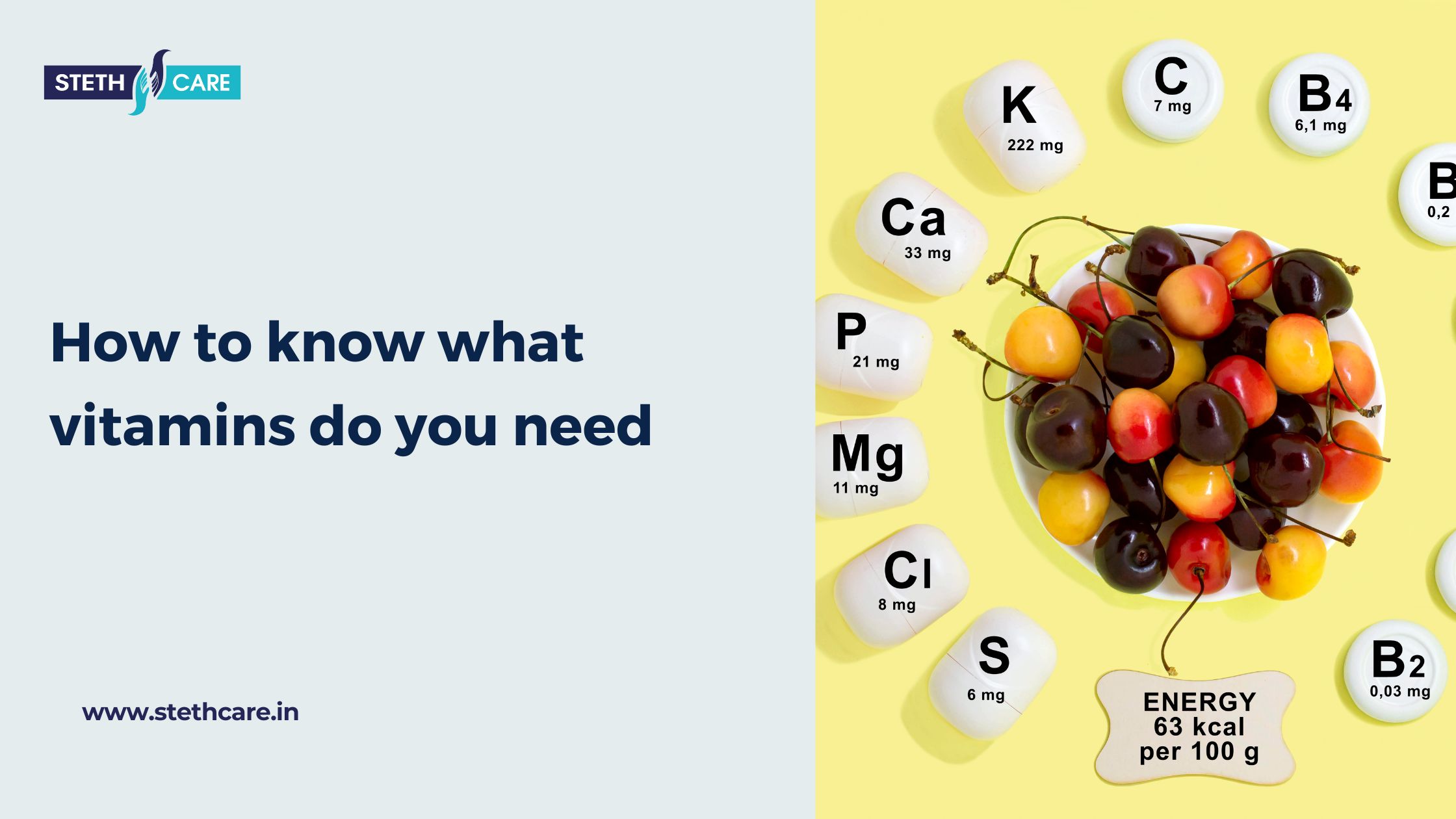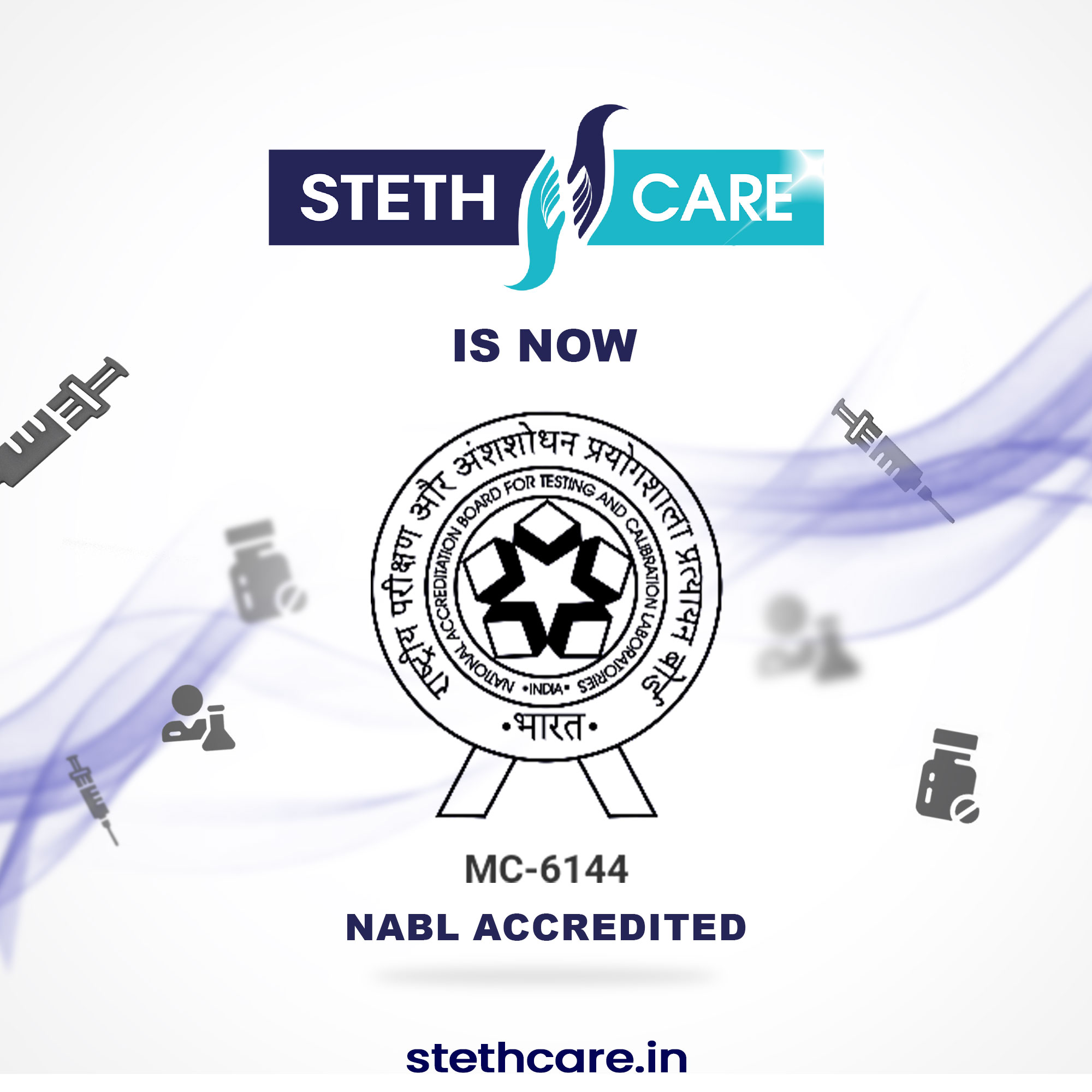
- Uncategorized
-
by yelleswari
Introduction
Vitamins are essential micronutrients that play a crucial role in various bodily functions, including metabolism, immune function, and tissue repair. While a well-balanced diet is the primary source of vitamins, determining your specific vitamin needs can be challenging. At Stethcare Diagnostic Centre, we understand the importance of personalized nutrition and offer insights into how to identify the vitamins your body requires for optimal health and well-being.
Understanding Vitamin Basics
What are Vitamins?
Vitamins are organic compounds that are essential for normal growth, development, and overall health. They are classified into two categories: fat-soluble vitamins (A, D, E, and K) and water-soluble vitamins (B vitamins and vitamin C). Each vitamin serves unique functions in the body and must be obtained from dietary sources or supplements.
Functions of Vitamins
Vitamins play diverse roles in the body, ranging from supporting immune function and energy production to promoting healthy skin, vision, and bone health. Deficiencies in specific vitamins can lead to a variety of health issues, while adequate intake contributes to overall well-being and disease prevention.
Assessing Your Vitamin Needs
Evaluate Your Diet
Start by assessing your current dietary intake to identify potential gaps in vitamin consumption. Keep a food diary or use nutrition-tracking apps to monitor your meals and snacks, paying attention to foods rich in vitamins. Look for patterns or trends in your diet that may indicate deficiencies in certain vitamins.
Consider Lifestyle Factors
Your lifestyle and life stage can also influence your vitamin needs. Factors such as age, gender, pregnancy or lactation, physical activity level, and underlying health conditions can impact your vitamin requirements. Consult with a healthcare professional, such as those at Stethcare Diagnostic Centre, to evaluate your specific nutritional needs based on your individual circumstances.
Undergo Diagnostic Testing
For a comprehensive assessment of your vitamin status, consider undergoing diagnostic testing at Stethcare Diagnostic Centre. Blood tests can measure vitamin levels in your body, providing valuable insights into potential deficiencies or excesses. Our experienced healthcare professionals can interpret test results and offer personalized recommendations to address any imbalances.
Maintaining a Balanced Diet
Eat a Variety of Foods
Aim for a diverse and balanced diet that includes a wide range of nutrient-rich foods. Incorporate plenty of fruits, vegetables, whole grains, lean proteins, and healthy fats into your meals to ensure adequate vitamin intake. Choose colourful foods, as different hues often indicate a variety of vitamins and antioxidants.
Focus on Nutrient-Dense Options
opt for nutrient-dense foods that are rich in vitamins and minerals, such as leafy greens, berries, nuts, seeds, fish, and legumes. Limit processed foods, sugary snacks, and refined carbohydrates, which are often devoid of essential nutrients and may contribute to vitamin deficiencies over time.
Consider Supplementation
In some cases, supplementation may be necessary to meet your vitamin needs, especially if you have specific dietary restrictions, medical conditions, or lifestyle factors that affect nutrient absorption. Consult with a healthcare provider at Stethcare Diagnostic Centre before starting any vitamin supplements to ensure they are appropriate for your individual needs.
FAQS
1. How can I tell if I need to take vitamin supplements?
Determining whether you need to take vitamin supplements involves assessing your dietary intake, lifestyle factors, and potential symptoms of deficiency. If you suspect you may have inadequate vitamin levels, consult with a healthcare professional at Stethcare Diagnostic Centre for personalized guidance and diagnostic testing.
2. What are the signs of vitamin deficiency?
Symptoms of vitamin deficiency vary depending on the specific vitamin involved but may include fatigue, weakness, poor immune function, skin problems, and cognitive issues. If you experience persistent symptoms or have concerns about your nutritional status, consider undergoing diagnostic testing at Stethcare Diagnostic Centre for further evaluation.
3. Can I get all the vitamins I need from food alone?
While a well-balanced diet provides many essential vitamins, some individuals may have difficulty obtaining adequate levels of certain vitamins from food alone due to dietary restrictions, medical conditions, or lifestyle factors. In such cases, supplementation may be recommended after consultation with a healthcare provider at Stethcare Diagnostic Centre.
4. How often should I undergo diagnostic testing to assess my vitamin levels?
The frequency of diagnostic testing for vitamin levels depends on individual factors such as age, health status, dietary habits, and risk factors for deficiency. Generally, routine testing may be recommended during annual check-ups or as part of specific health assessments conducted by healthcare professionals at Stethcare Diagnostic Centre.
5. Are there any risks associated with taking vitamin supplements?
While vitamin supplements can be beneficial for addressing deficiencies, excessive intake of certain vitamins may pose risks to health. It’s essential to follow recommended dosages and consult with a healthcare provider before starting any supplements, especially if you have underlying health conditions or are taking medications.
6. Can vitamin deficiencies be corrected through dietary changes alone?
In some cases, mild vitamin deficiencies can be corrected through dietary changes by incorporating nutrient-rich foods into your meals. However, severe deficiencies or specific medical conditions may require supplementation to restore optimal vitamin levels. Consult with a healthcare professional at Stethcare Diagnostic Centre for personalized recommendations tailored to your needs.
7. How long does it take to see improvements in vitamin levels after starting supplementation?
The timeline for seeing improvements in vitamin levels varies depending on factors such as the severity of deficiency, the type of supplement used, and individual response to treatment. In general, consistent supplementation and adherence to recommended dosages are essential for achieving and maintaining optimal vitamin levels.
8. How can Stethcare Diagnostic Centre help me determine my vitamin needs?
Stethcare Diagnostic Centre offers comprehensive diagnostic services, including blood tests to assess vitamin levels and nutritional status. Our experienced healthcare professionals can interpret test results, provide personalized recommendations, and offer guidance on optimizing your vitamin intake for optimal health and well-being. Schedule a consultation with us today to learn more about how we can support your nutritional needs.
Conclusion
In conclusion, understanding your vitamin needs is essential for maintaining optimal health and well-being. By evaluating your diet, considering lifestyle factors, and undergoing diagnostic testing when necessary, you can identify any deficiencies or excesses and make informed choices to support your nutritional requirements. Stethcare Diagnostic Centre is committed to helping you achieve your health goals by providing personalized guidance and comprehensive care. Together, we can unlock the mystery of your vitamin needs and pave the way for a healthier future.
